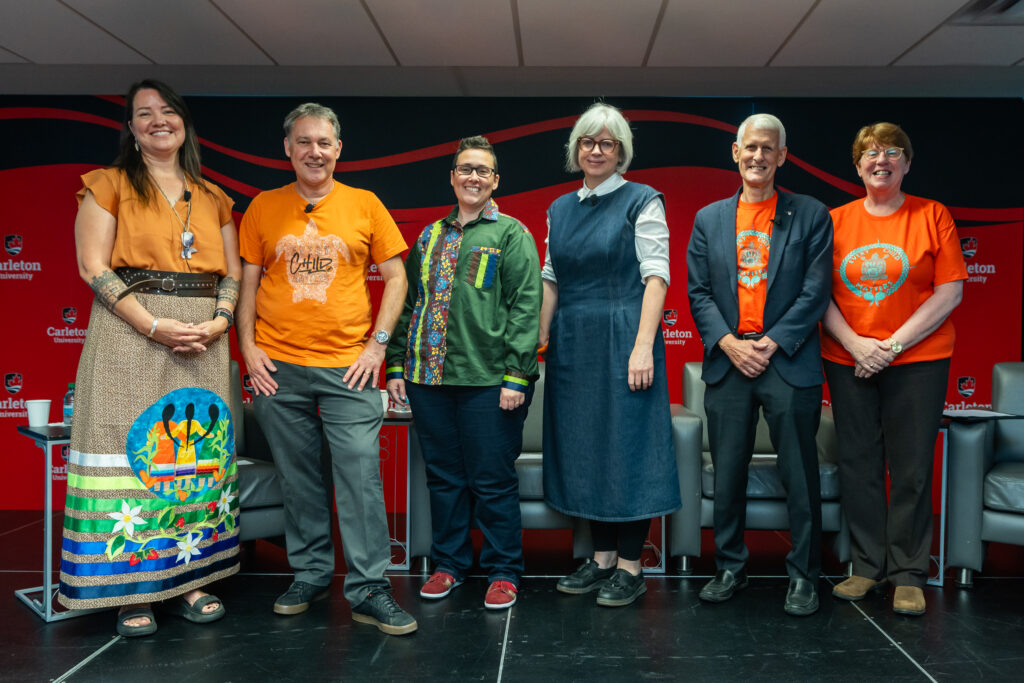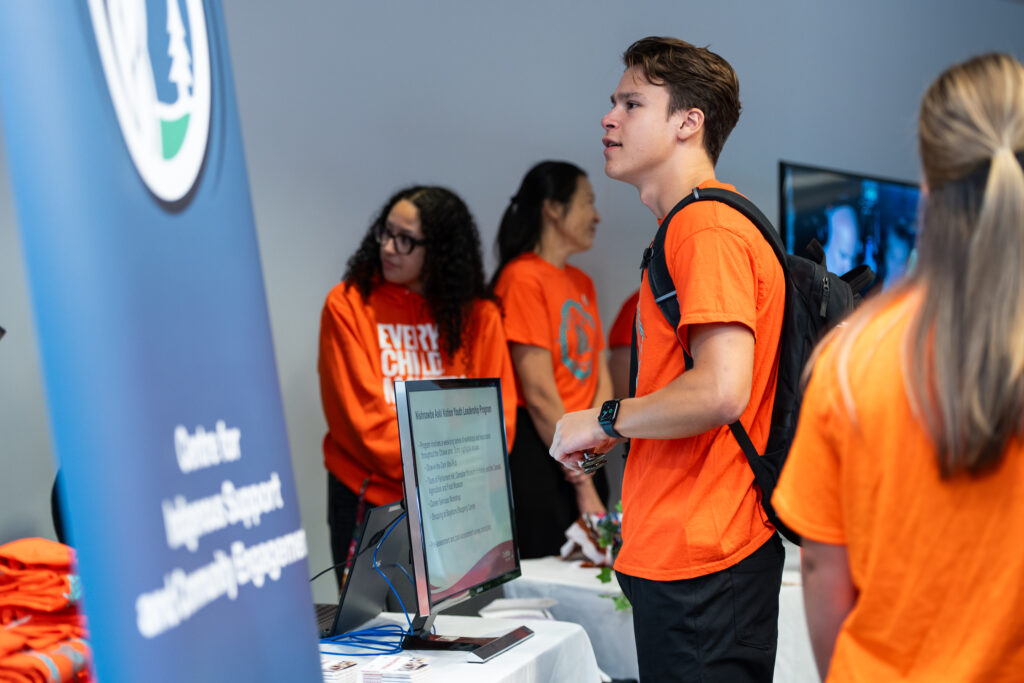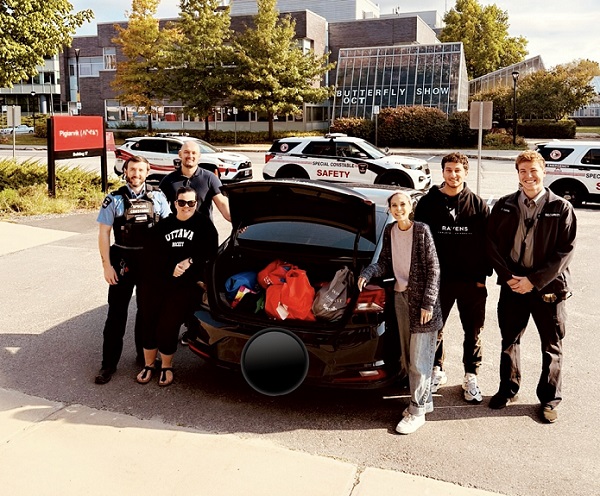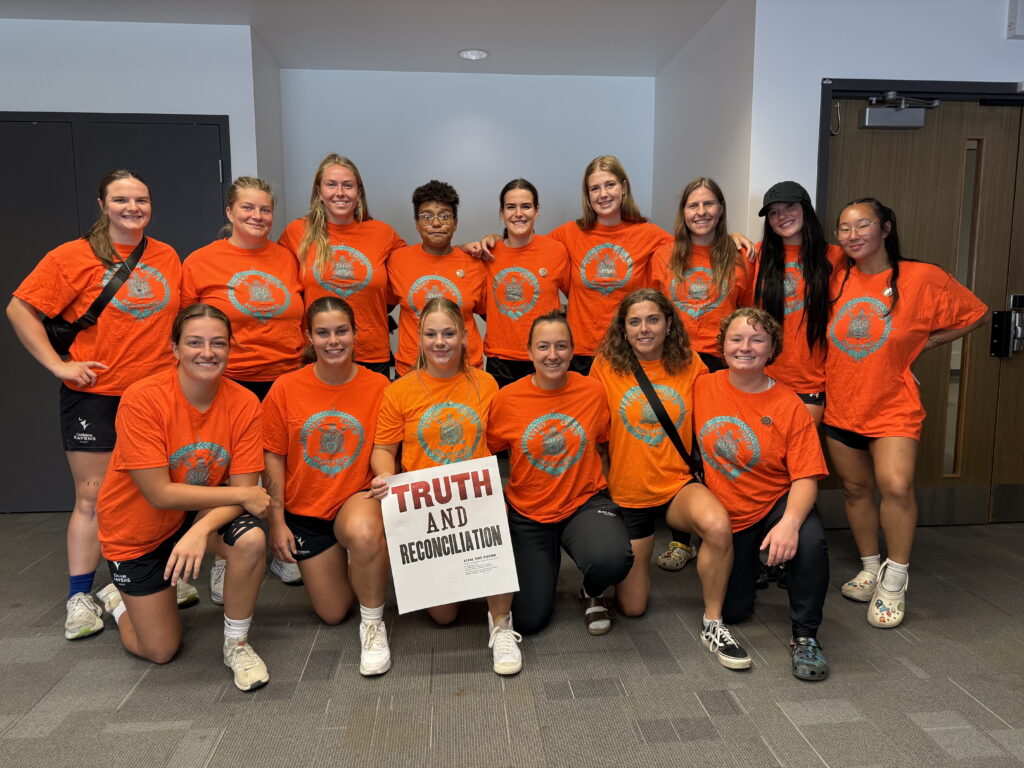Walking Together in Allyship: Carleton Reflects on Conciliation with Indigenous Peoples on Orange Shirt Day
The importance of listening, reflecting and acting with humility was at the forefront of this week’s event held in honour of Orange Shirt Day—an annual day of remembrance to acknowledge the history and harmful impacts of Canada’s residential and day school system.
On Sept. 30, close to 200 Carleton University faculty, staff and students attended the “Walking Together in Allyship: A Panel Discussion in Honour of Orange Shirt Day” event, which featured panelists and speakers from across the university community.
“This day invites us all to reflect on this part of Canada’s history and the legacy it continues to carry with it in the form of intergenerational trauma,” said Provost and Vice-President (Academic) L. Pauline Rankin, who hosted the event.
The event theme—Walking Together in Allyship—was chosen as a way of honouring residential school survivors and creating space for non-Indigenous faculty, staff and students to actively reflect on ways in which they can work towards Indigenous allyship.
“Walking in allyship with Indigenous Peoples is crucial to amplify the voices of Indigenous communities, address historical injustices and enable meaningful action towards conciliation,” said Rankin. “Allyship means more than standing in solidarity—it demands ongoing action. It requires us to challenge colonial structures, educate ourselves, and actively support Indigenous-led initiatives both here at Carleton and beyond.”

Benny Michaud, director of the Centre for Indigenous Support and Community Engagement at Carleton, offered reflections on allyship within the context of the university, emphasizing the importance of humility.
“Our elders, our community members and our families call on us to remember that the significance of this day stemmed from the experience of one little girl on her first day in residential school,” said Michaud.
Orange Shirt Day was inspired by the story of residential school survivor Phyllis Webstad, whose orange shirt—which was removed by school authorities on her first day of school—has become a symbol of the harmful impacts of Canada’s residential and day school system.
“This was one encounter between an Indigenous child and a non-Indigenous residential school administrator, an instance where what matters to an Indigenous person was overlooked and summarily dismissed,” said Michaud.
“It’s an encounter that, unfortunately, in many ways, remains representative of ongoing relationships between Indigenous and non-Indigenous people in Canada. The daily experiences of Indigenous people in our own circles tend to be overlooked, and in order for conciliation to occur, we have to focus our attention on how we’re engaging one another here at Carleton.”
The panel discussion, moderated by Kahente Horn-Miller, Associate Vice-President, Indigenous Teaching, Learning and Research, focused on ways in which Indigenous allyship can occur in a respectful way.
“The work of conciliation is not something that is up to Indigenous folks to do,” she said. “It’s everybody considering how we can work together collectively to strengthen each other.”

Panelists Jerry Tomberlin, Interim President and Vice-Chancellor; Sandra Dyck, Director, Carleton University Art Gallery; and Prof. Stephan Schott (Public Policy and Administration), shared stories about their ongoing journeys towards Indigenous allyship.
Tomberlin emphasized the need to listen, learn and walk alongside Indigenous friends and colleagues with humility and patience.
Dyck spoke about the role of art in sparking necessary, though sometimes difficult, conversations about conciliation, while also reflecting on the institutional barriers that prevent many from feeling welcome in public spaces.
Schott highlighted that allyship is not about individualism, and that Indigenous allyship in field research requires a commitment to working towards a long-term vision and challenging colonial views.
Throughout the event, guests were reminded that allyship is an ongoing process requiring continuous learning and reflection. Whether through developing new institutional strategies or engaging directly with Indigenous communities, the panelists emphasized that allyship must respond to the specific needs of Indigenous Peoples.
On Sept. 30, Carleton also honoured Orange Shirt Day by raising an Every Child Matters flag, illuminating the north end campus bridge in orange, and hosting a food drive in support of Minwaashin Lodge. The food drive, led by Campus Safety Services, received a boost from the Carleton Ravens Women’s Rugby team, who encouraged fans to bring donations to their Sept. 29 home game.

Kinàmàgawin Gallery displaying Carleton’s collective progress towards the Kinàmàgawin calls to action. 
Bridge at north-end of campus illuminated in orange.

Campus Safety Services food drive . 
Ravens Women’s Rugby honouring Orange Shirt Day.
Further information and resources for ongoing learning are available on the Indigenous Gathering Site